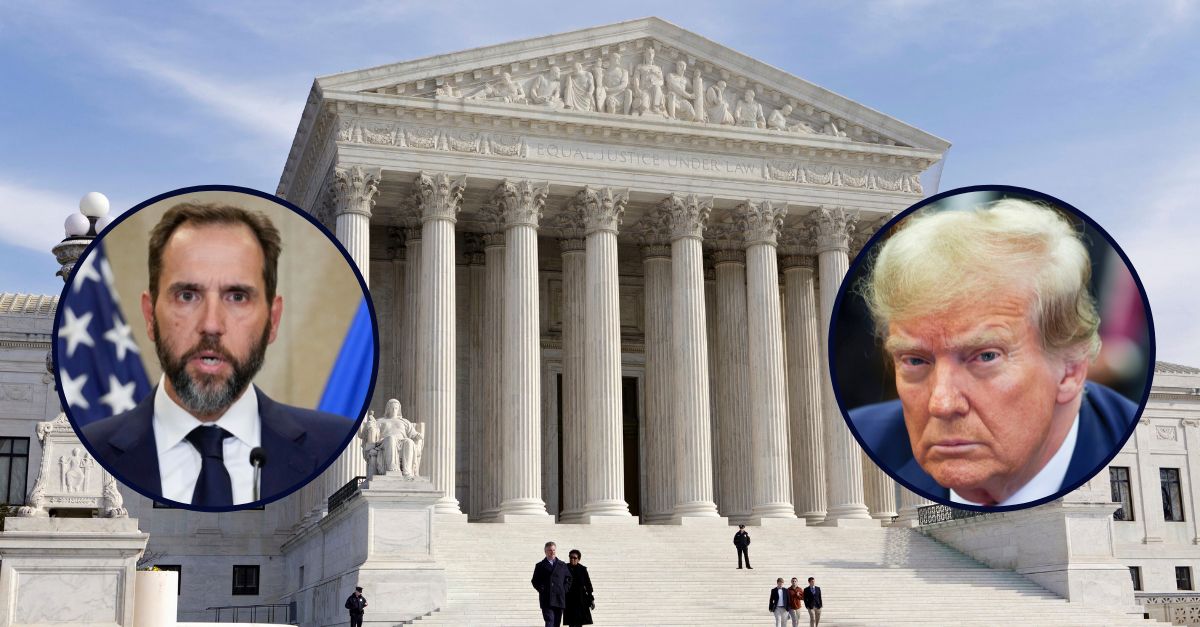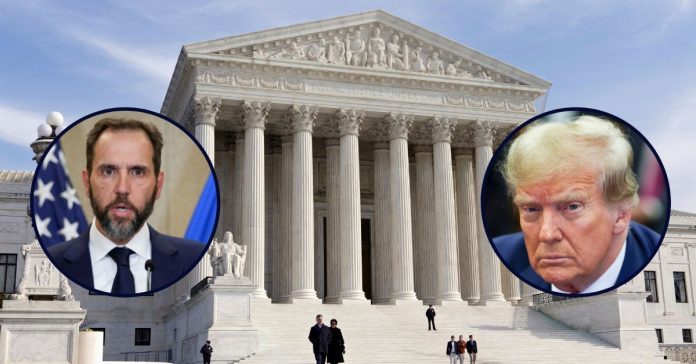
Background: U.S. Supreme Court. (AP Photo/J. Scott Applewhite, File). Inset left: FILE – Special counsel Jack Smith speaks to the media about an indictment of former President Donald Trump, Aug. 1, 2023, at an office of the Department of Justice in Washington. (AP Photo/J. Scott Applewhite, File). Inset right: Former President Donald Trump attends the closing arguments in the Trump Organization civil fraud trial at New York State Supreme Court in the Manhattan borough of New York, Jan. 11, 2024. (Shannon Stapleton/Pool Photo via AP, File)
Now it is up to the U.S. Supreme Court.
In a final response to special counsel Jack Smith’s brief arguing that Donald Trump not be permitted to delay his inevitable election subversion trial in Washington, D.C., any further, lawyers for the former president balked once more over the volume of discovery while hurling accusations of prosecutorial “partisanship.”
Where Smith has insisted for months that bringing Trump to trial is in the “compelling interest” of the public and the government, Trump’s attorney John Sauer argued Thursday that this suggestion was “erroneous” and that the “amorphous ‘public”” Smith refers to is irrelevant because “that right to a speedy trial belongs to the defendant” first.
The 16-page brief mostly served to excoriate the special counsel as well as the federal criminal charges that Trump conspired to overturn the results of the 2020 election and disenfranchise voters.
“Reaching a decision on immunity will require careful and deliberate review of myriad historical sources and could even require additional fact-finding,” Sauer wrote Thursday.
With the brief filed, the next move belongs to the nation’s high court.
Meanwhile, Trump’s bid for the White House in 2024 loomed large as Sauer leveled accusations that the motivation to bring Trump to trial before Nov. 5 was “obvious to everyone else.”
“Pursuing that partisan motivation twists the Special Counsel into logical knots, as he now begs this Court not to decide issues that, two months ago, he begged the Court to decide,” Sauer wrote.
But in the last week of briefs alone, a more nuanced story exists. Smith asked a day ago what Trump’s lawyers asked Thursday: if the court will not deny Trump’s bids to delay, then they should treat his request for a stay as a petition to the court for oral arguments on the immunity question. The special counsel had already asked the court in December to review that question but the high court denied him without explanation.
On Monday, after weeks of filings flowed back and forth, Trump asked the Supreme Court to indefinitely pause the case in Washington, D.C., after the U.S. Court of Appeals for the D.C. Circuit rejected his claim of total immunity from criminal prosecution for actions taken while in office. His lawyers have maintained that because it seems likely that ruling would be overturned, the Supreme Court should step in to slow things down.
Trump was ordered to stand trial for the election subversion charges on March 4 but his interlocutory appeals on the immunity question have gummed up the works significantly since his initial indictment in August 2023.
His legal team spent weeks working to dismiss the case and to no avail, including by calling for U.S. District Judge Tanya Chutkan’s recusal. But when finally setting the docket, Chutkan split the difference between the more than yearlong delay Trump initially requested and the January 2024 trial requested by prosecutors.
Meanwhile, in his brief to the Supreme Court late Thursday, Sauer reiterated his defense that Trump’s alleged conduct was not criminal but part of Trump’s official duties as president. He underlined to the high court that Smith had not distinguished between an “official” act and an “unofficial” act.
But the preceding reply from the special counsel did summarily argue that any criminal attempt to thwart an election would be, inherently, unofficial.
More specifically, Smith wrote that Trump’s “alleged criminal scheme to overturn an election and thwart the peaceful transfer of power to his successor should be the last place to recognize a novel form of absolute immunity from federal criminal law.”
Though Trump’s immunity argument has twice been rejected, Sauer wrote that it seemed it was Smith who was “signaling a lack of confidence.”
Again, Trump’s immunity bid was rejected first at the lower district court level and then the appellate court. A three-judge panel in Washington, D.C. unanimously ruled against him and minced few words.
“For the purpose of this criminal case, former President Trump has become citizen Trump, with all the defenses of any other criminal defendant. But any executive immunity that may have protected him while he served as president no longer protects him against this prosecution,” they ruled.
Trump could still push to have an en banc ruling, or a ruling from the entire panel of the appellate court instead of just three judges.
If he does, it might not alleviate another concern Sauer raised in his brief: the sheer volume of records in discovery, a gripe his lawyers have made since August.
Notably, Sauer also argues the court should rule in their favor because there is still an unresolved question in the case of Jan. 6 rioter Joseph Fischer, a Pennsylvania police officer who charged at a line of law enforcement at the Capitol and is alleged to have had a “physical encounter” with at least police officer during the melee.
Fischer v. United States — which was approved for review by the Supreme Court in mid-December — asks the high court to resolve whether the U.S. Court of Appeals erred in its construction and application of a law that prohibits the obstruction of congressional inquiries. It could have far-reaching impacts on hundreds of Jan. 6 cases, but it is the very first time Trump’s lawyers have raised the point as a means to delay the case.
Trump has pleaded not guilty to all of the charges, and though things in Washington, D.C. have ground to a halt, the pace has picked up in New York where he faces a criminal indictment for allegedly falsifying business records to cover up hush money payments he made to porn star Stormy Daniels ahead of the 2016 election.
A judge locked in a March 25 trial date in that venue on Thursday morning.
Have a tip we should know? [email protected]

